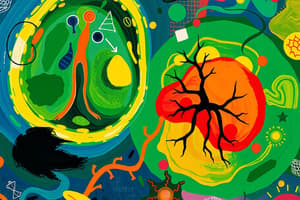Podcast
Questions and Answers
Which type of respiration produces the most ATP molecules?
Which type of respiration produces the most ATP molecules?
- Aerobic respiration (correct)
- Excretion
- Photosynthesis
- Anaerobic respiration
What is the primary function of the kidneys in the excretory system?
What is the primary function of the kidneys in the excretory system?
- To filter waste from blood and produce urine (correct)
- To remove carbon dioxide from the blood
- To filter waste from blood and produce bile
- To sweat out excess water and salts
What is the main function of the circulatory system?
What is the main function of the circulatory system?
- To remove waste products from the body
- To produce glucose through photosynthesis
- To obtain energy through respiration
- To deliver oxygen and nutrients to cells and remove waste products (correct)
What is the byproduct of photosynthesis that is released into the atmosphere?
What is the byproduct of photosynthesis that is released into the atmosphere?
What type of nutrition involves producing one's own food through photosynthesis?
What type of nutrition involves producing one's own food through photosynthesis?
In which organelle does respiration occur?
In which organelle does respiration occur?
What is the primary function of the liver in the excretory system?
What is the primary function of the liver in the excretory system?
What is the equation for photosynthesis?
What is the equation for photosynthesis?
What is the importance of respiration?
What is the importance of respiration?
What is the primary function of the circulatory system in terms of nutrition?
What is the primary function of the circulatory system in terms of nutrition?
Flashcards are hidden until you start studying
Study Notes
Respiration
- Process by which cells generate energy from glucose
- Involves the breakdown of glucose to produce ATP
- Occurs in the mitochondria
- There are two types:
- Aerobic respiration (oxygen present): produces 36-38 ATP molecules
- Anaerobic respiration (oxygen absent): produces 2 ATP molecules
- Importance: provides energy for cellular activities
Excretion
- Process by which waste products are removed from the body
- Types of excretory organs:
- Kidneys: filter waste from blood, produce urine
- Liver: filters waste from blood, produces bile
- Lungs: remove carbon dioxide
- Skin: removes water and salts through sweating
- Importance: maintains homeostasis, prevents toxin buildup
Circulation
- Process by which blood is circulated throughout the body
- Components:
- Heart: pumps blood throughout the body
- Arteries: carry oxygenated blood away from the heart
- Veins: carry deoxygenated blood back to the heart
- Blood vessels: allow exchange of oxygen and nutrients with cells
- Importance: delivers oxygen and nutrients to cells, removes waste products
Photosynthesis
- Process by which plants produce glucose from sunlight
- Occurs in chloroplasts
- Equation: 6CO2 + 6H2O + light energy → C6H12O6 (glucose) + 6O2
- Importance: produces oxygen, provides energy for plants
Nutrition
- Process by which organisms obtain energy and nutrients
- Types:
- Autotrophic: produce own food through photosynthesis
- Heterotrophic: obtain food by consuming other organisms
- Importance: provides energy and building blocks for growth and maintenance
Transportation
- Process by which materials are moved within an organism
- Types:
- Passive transport: movement of materials without energy input (diffusion, osmosis)
- Active transport: movement of materials against concentration gradient using energy
- Importance: maintains homeostasis, allows for proper functioning of cells and organs
Respiration
- Generates energy from glucose for cells
- Breaks down glucose to produce ATP (energy currency)
- Takes place in mitochondria, occurs in two types:
- Aerobic respiration: 36-38 ATP, oxygen present
- Anaerobic respiration: 2 ATP, oxygen absent
Excretion
- Removes waste products from the body
- Excretory organs:
- Kidneys: filter blood, produce urine
- Liver: filter blood, produce bile
- Lungs: remove carbon dioxide
- Skin: remove water, salts through sweating
- Maintains homeostasis, prevents toxin buildup
Circulation
- Circulates blood throughout the body
- Components:
- Heart: pumps blood
- Arteries: carry oxygenated blood
- Veins: carry deoxygenated blood
- Blood vessels: allow oxygen, nutrient exchange with cells
- Delivers oxygen, nutrients to cells, removes waste products
Photosynthesis
- Produces glucose from sunlight in chloroplasts
- Equation: 6CO2 + 6H2O + light energy → C6H12O6 (glucose) + 6O2
- Produces oxygen, provides energy for plants
Nutrition
- Obtains energy, nutrients for organisms
- Types:
- Autotrophic: produces own food through photosynthesis
- Heterotrophic: obtains food by consuming other organisms
- Provides energy, building blocks for growth, maintenance
Transportation
- Moves materials within an organism
- Types:
- Passive transport: movement without energy input (diffusion, osmosis)
- Active transport: movement against concentration gradient using energy
- Maintains homeostasis, allows proper cell, organ function
Studying That Suits You
Use AI to generate personalized quizzes and flashcards to suit your learning preferences.




